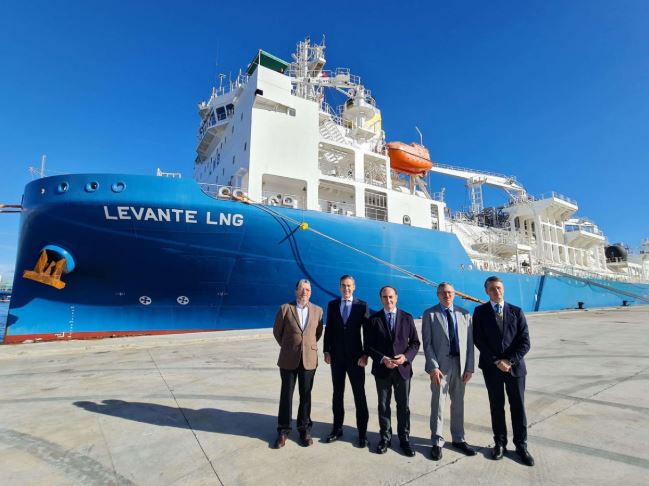 Stefano Campagnolo, project manager at the European Climate, Infrastructure and Environment Executive Agency (CINEA), has visited the Port of Algeciras to ratify the start-up of the air quality improvement project in the Port of Algeciras and its area of influence, promoted by Enagás -through its subsidiary Scale Gas- and Peninsula, according to Enagas's release.
Stefano Campagnolo, project manager at the European Climate, Infrastructure and Environment Executive Agency (CINEA), has visited the Port of Algeciras to ratify the start-up of the air quality improvement project in the Port of Algeciras and its area of influence, promoted by Enagás -through its subsidiary Scale Gas- and Peninsula, according to Enagas's release.
This project for the reduction of the carbon footprint of maritime transport, which has promoted the construction and operation of the ‘Levante LNG’, a ship supplying liquefied natural gas (LNG) to ships, is co-funded by the Connecting Europe Facility (CEF) transport aid programme.
Since its commissioning in September 2023, ‘Levante LNG’, which carries out cargoes of up to 12,500m3 of LNG capacity at the Enagás regasification plant in Huelva, has positioned itself as the vessel supplying LNG to ships with the most operations in southern Spain this year.
Up to the end of September, it has carried out 42 ship-to-ship supply operations, with a total of 124,000 m3 supplied in the Port of Algeciras and its area of influence. ‘Levante LNG’, chartered by Peninsula, is the only one of its kind operating in Andalusia and one of three operating in Spain.
The initiative is part of the European Union’s Connecting Europe Facility (CEF) transport aid programme, which co-finances up to 11 million euros, through a consortium coordinated by Enagás and Peninsula with the participation of Scale Gas and the Port Authority of Algeciras.
This agreement is part of the ‘LNGhive 2’ strategy, under the aegis of Puertos del Estado, which aims to support the development of the LNG market as a sustainable maritime fuel, in line with the European Directive 94/2014 on alternative fuels to improve air quality at sea and in ports.
A sustainable transition LNG is a fuel that complies with the current regulation of the International Maritime Organization (IMO 2020), which introduced the limit of 0.5% sulphur content in marine fuels. Peninsula has set the standard in the bunkering industry in terms of compliance with this regulation.
Compared to traditional maritime fuels, liquefied natural gas practically eliminates emissions of sulphur oxide (SOX), while also reducing nitrogen oxide (NOX) emissions by 80-90% and CO2 emissions by 20-30%. CO2 emissions can be reduced by about two million tonnes by 2030, through using LNG as a maritime fuel in Spain. This would be equivalent to replacing more than one million combustion vehicles with electric vehicles.



